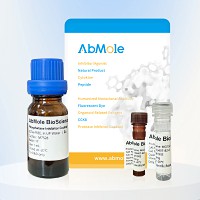All AbMole products are for research use only, cannot be used for human consumption.

DPP4/CD26 is a signal-anchor for type II membrane protein that belongs to the peptidase S9B family. DPP4/CD26 acts as a positive regulator of T-cell coactivation, by binding at least ADA, CAV1, IGF2R, and PTPRC. It's binding to CAV1 and CARD11 induces T-cell proliferation and NF-kappa-B activation in a T-cell receptor/CD3-dependent manner. It acts also as a serine exopeptidase with a dipeptidyl peptidase activity that regulates various physiological processes by cleaving peptides in the circulation, including many chemokines, mitogenic growth factors, neuropeptides and peptide hormones.
Recombinant Human Dipeptidyl Peptidase 4 expressed the target gene encoding Asn29-Pro766 with a 6His tag at the C-terminus.
Accession: P27487
Endotoxin < 1 EU/µg
Apparent Molecular Weight: 90-130 KDa, reducing conditions
Lyophilized from a 0.2 μm filtered solution of 20mM Tris-HCl, 10% Trehalose, 100mM NaCl, 0.05% Tween 80, pH 8.5.
| Form | Lyophilized powder |
| Solubility (25°C) | Reconstitute the lyophilized powder in distilled water up to 100 μg/ml. |
| Storage | Stored at ≤ -20°C, stable for one year after receipt. Reconstituted protein solution can be stored at 2-8°C for 2-7 days and at -20°C for 3 months. |
| Related Enzymes & Regulators Products |
|---|
| Recombinant Human DPP-4/CD26 Protein (HEK293, N-hFc)
Dipeptidyl peptidase-4 (DPP4) is a serine exopeptidase belonging to the S9B protein family. The enzyme is a type II transmembrane glycoprotein, expressed on the surface of many cell types. It is also present in serum and other body fluids in a truncated form (sCD26/DPPIV). As both a regulatory enzyme and a signalling factor, DPP4 has been evaluated and described in many studies. DPP4 inhibition results in increased blood concentration of the incretin hormones glucagon-like peptide-1 (GLP-1) and gastric inhibitory polypeptide (GIP). |
| Recombinant Human SOD1 Protein (E. coli, N-6His)
SOD1 binds copper and zinc ions and is one of three isozymes responsible for destroying free superoxide radicals in the body. SOD1 neutralizes supercharged oxygen molecules, which can damage cells if their levels are not controlled. The enzyme protects the cell against dangerous levels of superoxide. |
| Recombinant Human SOD2 (HEK293, C-6His)
SOD2 is a mitochondrial matrix protein that forms a homotetramer and binds one manganese ion per subunit. SOD2 transforms toxic superoxide, a byproduct of the mitochondrial electron transport chain into hydrogen peroxide and diatomic oxygen. |
| Recombinant Human MMP13 Protein (E. coli, N-His)
The MMP-13 protein plays a role in the degradation of extracellular matrix proteins, especially fibrillar collagen, fibronectin, TNC, and ACAN. It cleaves triple-helical collagen, preferentially cleaves type II collagen, and can also target other collagen types. |
| Recombinant Mouse DPP-4/CD26 Protein (HEK293, N-hFc)
Dipeptidyl peptidase-4 (DPP4, CD26) is a serine exopeptidase belonging to the S9B protein family. The enzyme is a type II transmembrane glycoprotein, expressed on the surface of many cell types. It is also present in serum and other body fluids in a truncated form (sCD26/DPPIV). |
All AbMole products are for research use only, cannot be used for human consumption or veterinary use. We do not provide products or services to individuals. Please comply with the intended use and do not use AbMole products for any other purpose.


Products are for research use only. Not for human use. We do not sell to patients.
© Copyright 2010-2024 AbMole BioScience. All Rights Reserved.
